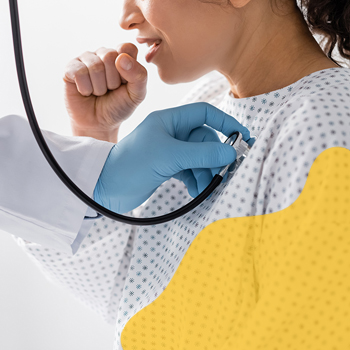Forgot password? Reset here
Pneumonia
Pneumonia is
swelling (inflammation) of the tissue in one or both lungs. It's usually caused
by a bacterial infection. It can also be caused by a virus, such as coronavirus
(COVID-19).
Symptoms
of Pneumonia
The symptoms
of pneumonia can develop suddenly over 24 to 48 hours, or they may come on more
slowly over several days.
Common
symptoms of pneumonia include:
· A cough – which
may be dry, or produce thick yellow, green, brown or blood-stained mucus
(phlegm)
· Difficulty
breathing – your breathing may be rapid and shallow, and you may feel
breathless, even when resting
· Rapid heartbeat
· High temperature
· Feeling
generally unwell
· Sweating and
shivering
· Loss of appetite
· Chest pain – which gets worse when breathing or coughing
Less common symptoms include:
· Coughing up
blood (haemoptysis)
· Headaches
· Fatigue
· Feeling sick or
being sick
· Wheezing
· Joint and muscle
pain
· Feeling confused
and disorientated, particularly in elderly people
When to
get medical help?
If you have
a high temperature, a new, continuous cough or a loss or change to your sense
of smell, use the 111 online coronavirus service.
If you feel
unwell and have any other symptoms of pneumonia, contact your GP or use the
regular 111 online service.
Only call
111 if you cannot get help online or you need help for a child under 5.
Call 999
for an ambulance if you or someone you care for:
· Are struggling
to breathe
· Are coughing up
blood
· Have blue lips
or a blue face
· Feel cold and
sweaty, with pale or blotchy skin
· Have a rash that
does not fade when you roll a glass over it
· Collapse or
faint
· Become confused
or very drowsy
· Have stopped
peeing or are peeing much less than usua
Who's
affected?
Pneumonia
can affect people of any age, but it's more common, and can be more serious, in
certain groups of people, such as the very young or the elderly People in these
groups are more likely to need hospital treatment if they develop pneumonia.
What
causes pneumonia?
Pneumonia is
usually the result of a bacterial infection.
As well as
bacterial pneumonia, other types include:
· Viral pneumonia
– caused by a virus, such as coronavirus
· Aspiration
pneumonia – caused by breathing in vomit, a foreign object, such as a peanut,
or a harmful substance, such as smoke or a chemical
· Fungal pneumonia
– rare in the UK and more likely to affect people with a weakened immune system
· Hospital-acquired
pneumonia – pneumonia that develops in hospital while being treated for another
condition or having an operation; people in intensive care on breathing
machines are particularly at risk of developing ventilator-associated pneumonia
Diagnosing pneumonia
A doctor may be able to diagnose pneumonia by asking about
your symptoms and examining your chest.
Further tests may be needed in some cases.
Pneumonia can be difficult to diagnose because it shares many
symptoms with other conditions, such as the common cold, bronchitis and asthma.
To help make a diagnosis, a doctor may ask you:
· whether you feel
breathless or you're breathing faster than usual
· how long you
have had your cough, and whether you're coughing up mucus and what colour it is
· if the pain in
your chest is worse when you breathe in or out
A doctor may also take your temperature and listen to your
chest and back with a stethoscope to check for any crackling or rattling
sounds.
They may also listen to your chest by tapping it. Lungs
filled with fluid produce a different sound from normal healthy lungs.
If you have mild pneumonia, you probably will not need to
have a chest X-ray or any other tests.
You may need a chest X-ray or other tests, such as a sputum
(mucus) test or blood tests, if your symptoms have not improved within 48 hours
of starting treatment.
Treating pneumonia
Mild pneumonia can usually be treated at home by:
· Getting plenty
of rest
· Taking
antibiotics if the pneumonia is likely to be caused by a bacterial infection
· Drinking plenty
of fluids
If you do not have any other health problems, you should
respond well to treatment and soon recover, although your cough may last for
some time.
For at-risk groups, pneumonia can be severe and may need to
be treated in hospital.
This is because it can lead to serious complications, which in some cases can be fatal, depending on a person's health and age.
Treatment Pneumonia
Mild pneumonia can usually be treated at home with rest,
antibiotics (if it's likely be caused by a bacterial infection) and by drinking
plenty of fluids. More severe cases may need hospital treatment.
Unless a healthcare professional tells you otherwise, you
should always finish taking a prescribed course of antibiotics, even if you
feel better.
If you stop taking an antibiotic part way through a course,
the bacteria can become resistant to the antibiotic.
After starting treatment, your symptoms should steadily
improve.
However, how quickly they improve will depend on how severe
your pneumonia is.
As a general guide, after:
· 1 week – high
temperature should have gone
· 4 weeks – chest
pain and mucus production should have substantially reduced
· 6 weeks – cough
and breathlessness should have substantially reduced
· 3 months – most
symptoms should have resolved, but you may still feel very tired (fatigue)
· 6 months – most
people will feel back to normal
Treatment
at home
Contact your
GP or 111 online if your symptoms do not improve within 3 days of starting
antibiotics.
Symptoms may
not improve if
· The bacteria
causing the infection is resistant to antibiotics – a GP may prescribe a
different antibiotic, or they may prescribe a second antibiotic for you to take
with the first one
· A virus is
causing the infection, rather than bacteria – antibiotics have no effect on
viruses, and your body's immune system will have to fight the viral infection
by creating antibodies
Painkillers,
such as paracetamol or ibuprofen, may help relieve pain and reduce fever.
However, you
should not take ibuprofen if you:
· Are allergic to
aspirin or other non-steroidal anti-inflammatory drugs (NSAIDs)
· Have asthma,
kidney disease, a history of stomach ulcers or indigestion
Cough
medicines are not recommended as there is little evidence they are effective. A
warm honey and lemon drink can help relieve discomfort caused by coughing.
Your cough
may persist for 2 to 3 weeks after you finish your course of antibiotics, and
you may feel tired for even longer as your body continues to recover.
Drink plenty
of fluids to avoid dehydration, and get plenty of rest to help your body
recover.
If you
smoke, it's more important than ever to stop, as smoking damages your lungs.
Contact a GP or 111 online if, after following these self-help measures, you're feeling worse or you're not feeling any better.
Treatment
in hospital
You may need
treatment in hospital if your symptoms are severe.
You should
be given antibiotics as soon as possible if your pneumonia is likely to be
caused by a bacterial infection.
You will
probably not be given antibiotics if the cause is likely to be a virus, such as
corona virus. This is because antibiotics do not work for viral infections.
You may also
be given fluids intravenously through a drip, and you may need oxygen to help
breathing.
In serious
cases of pneumonia, breathing assistance through a ventilator in an intensive
care unit (ICU) may be required.

